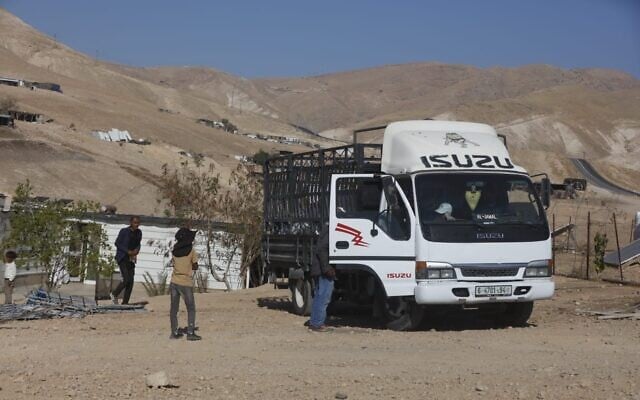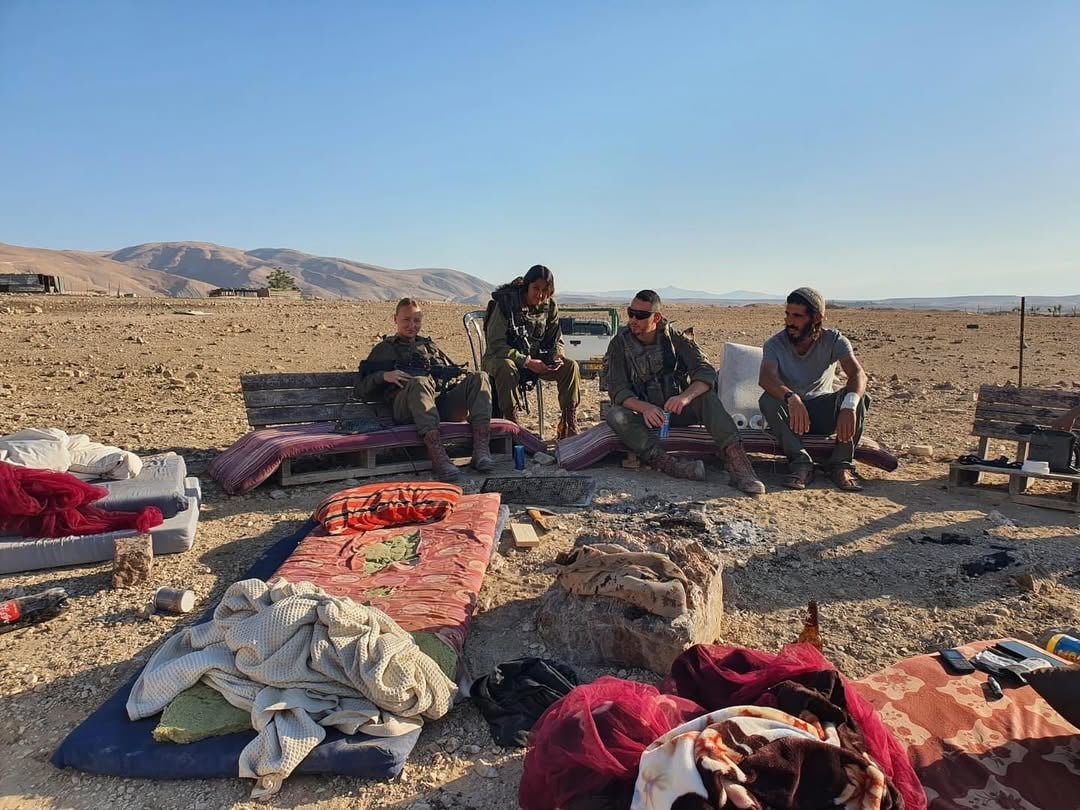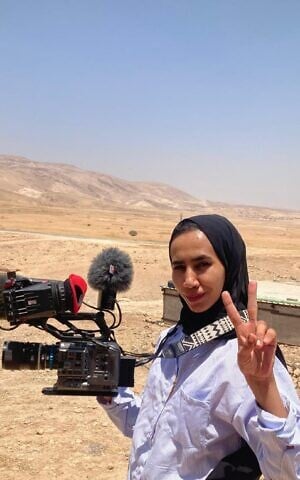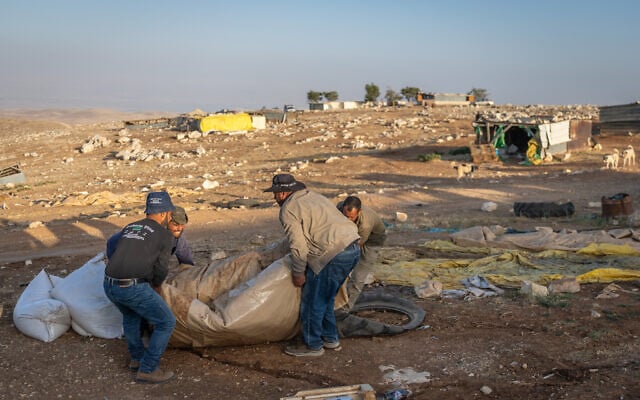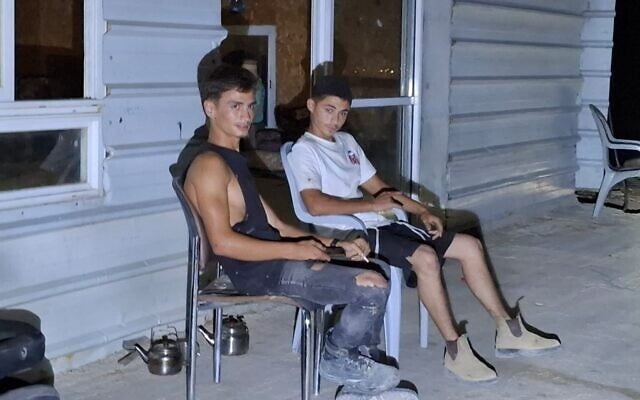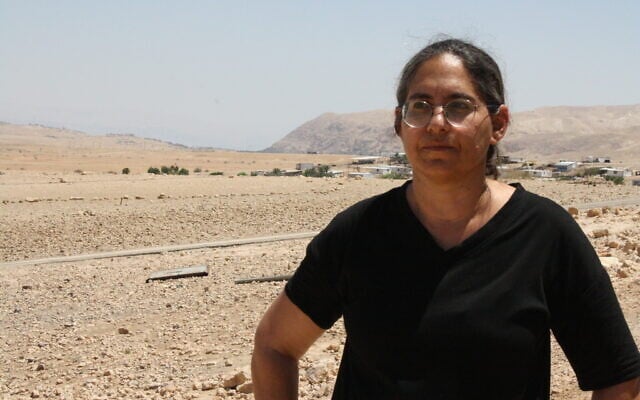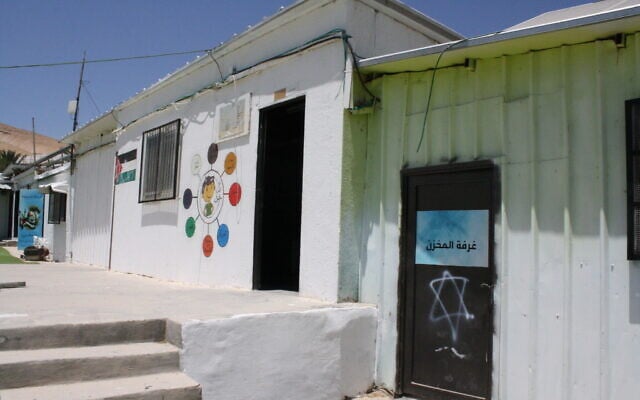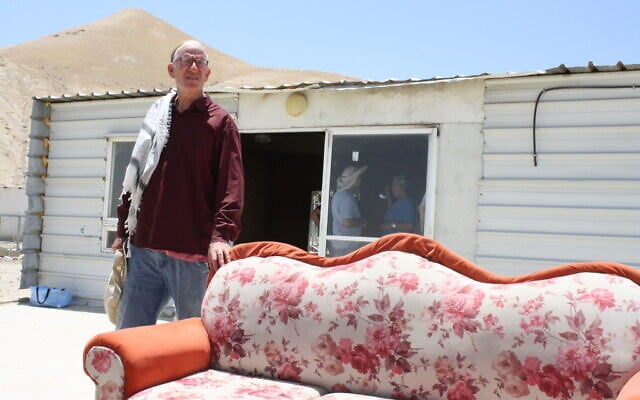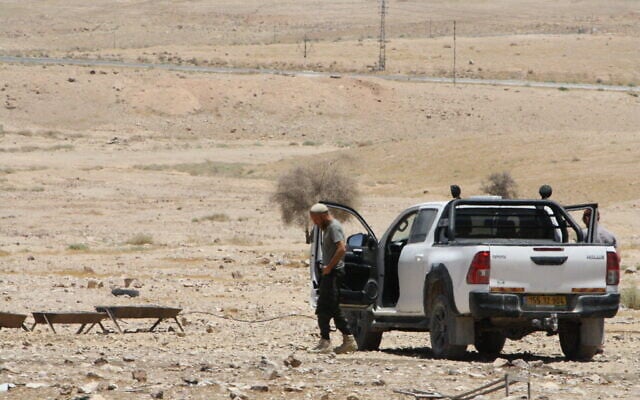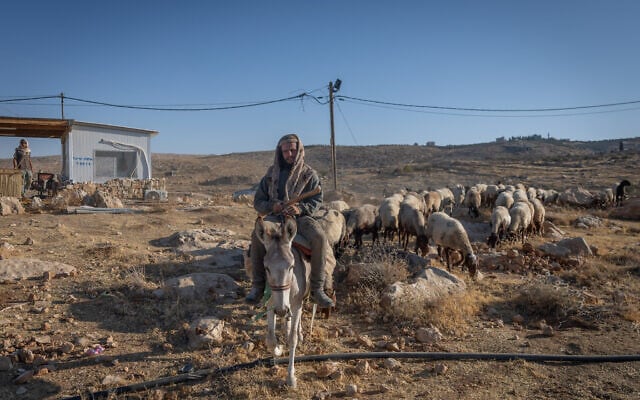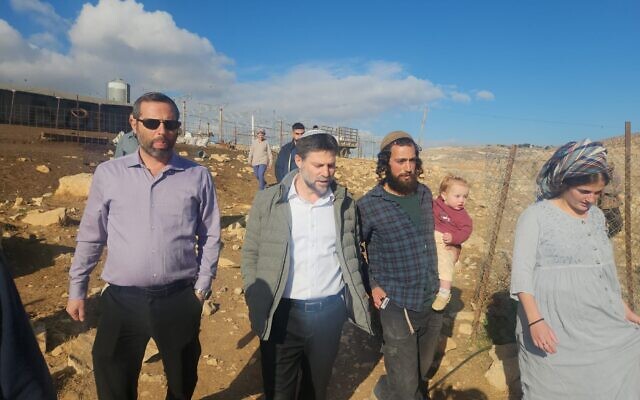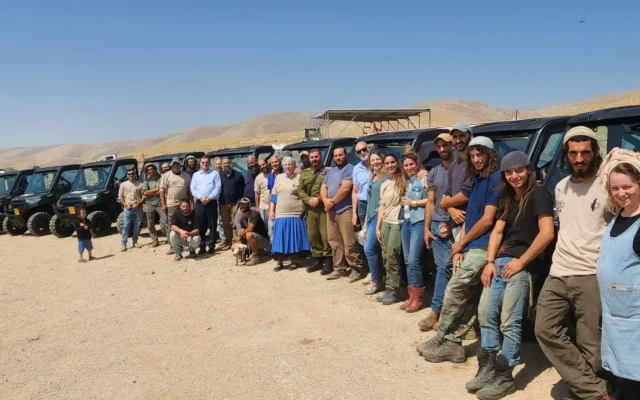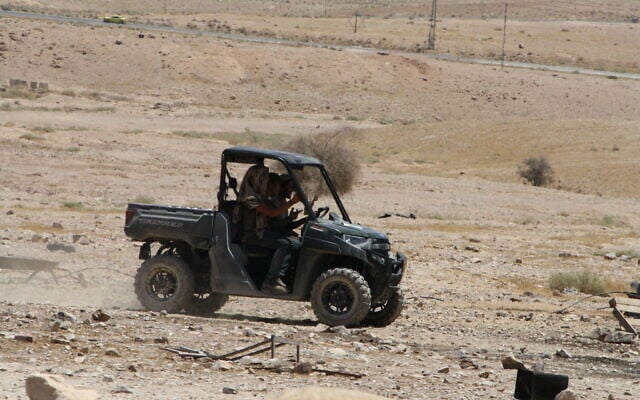


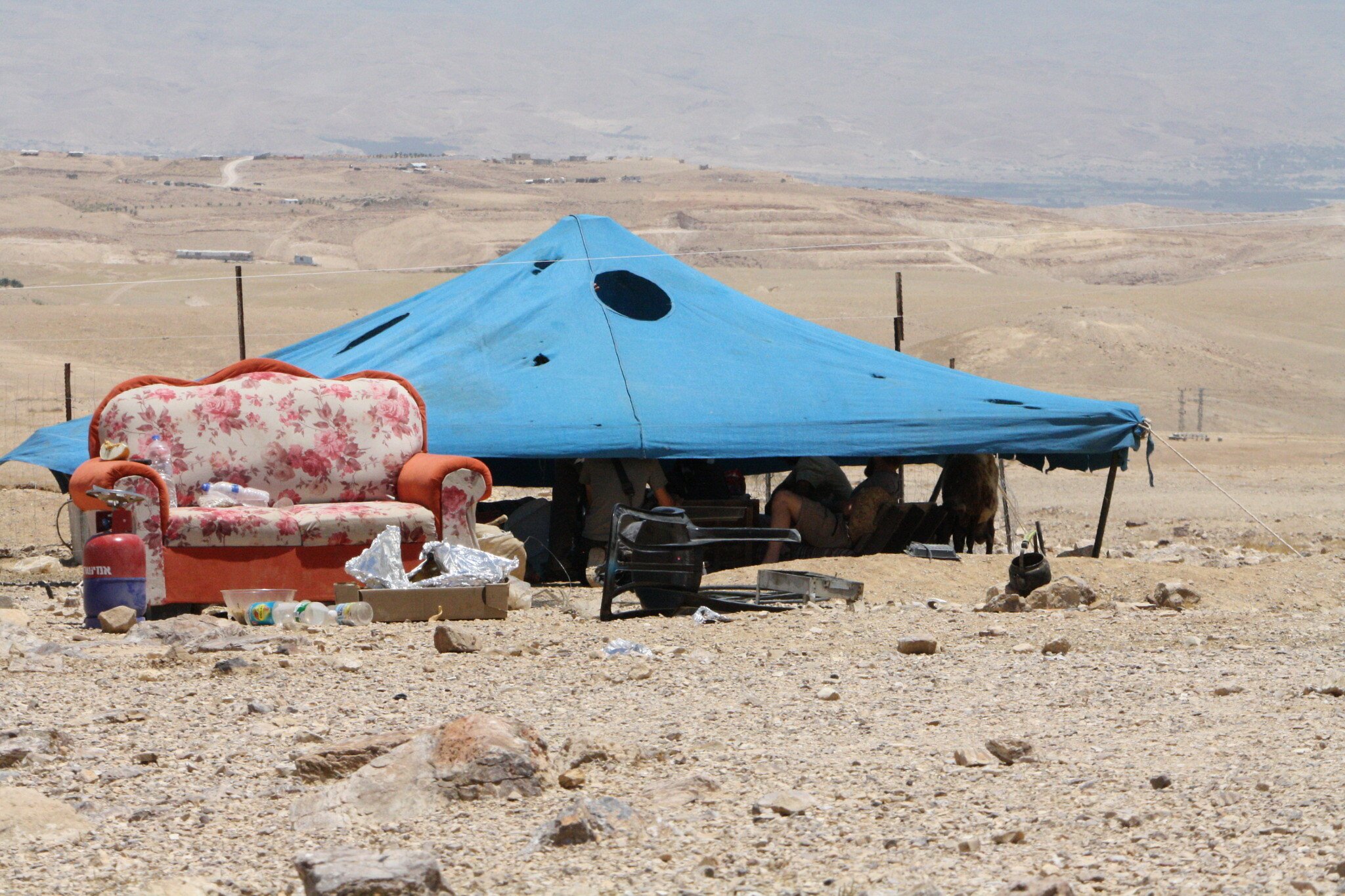
MU’ARRAJAT, West Bank — Until last week, some 30 Palestinian Bedouin families made their home in Mu’arrajat, a cluster of ramshackle homes, sheep pens and a EU-funded school in the rugged desert of the West Bank’s southern Jordan Valley.
Then the settlers showed up again.
On Thursday and Friday, unable to countenance the growing harassment and intimidation from Jewish extremists any longer, the families fled the village for good in fear for their lives, becoming the latest such hamlet in the area to be emptied out by Palestinians under a mounting wave of Israeli persecution.
Mu’arrajat was already abandoned when the Times of Israel visited the dusty hillside where it had stood on Sunday, save for several Israeli human rights activists there to guard some of the villagers’ remaining belongings.
Nearby, a small group of settlers rested in the shade of a tent they had set up, guarded by the armed security coordinator of a nearby settlement who claimed the land was within the Israeli community’s jurisdiction.
Gone were the Palestinian families, who are now scattered to tents and other temporary accommodations in nearby villages and towns.
According to Alia Mleihat, a 28-year-old resident of the hamlet, Mu’arrajat had been on the land for about 40 years before residents decided to pack up and leave late last week. She spoke with ToI on Monday by phone through a translator.
“We left our home with bitter tears,” said Mleihat, who left Mu’arrajat on Friday night together with her parents and four siblings. They are now living outdoors in a suburb of Jericho, she said.
Since Mleihat spoke to the Times of Israel, she and her family were forced to move on from the location they were staying in by IDF forces, she told activists in a WhatsApp group on Monday afternoon.
On Wednesday, residents and activists recalled, settlers had arrived in the village and started setting up encampments just meters from their homes. Attackers, who had harassed villagers in the past, broke into houses, stole property and livestock, destroyed belongings, and threatened physical violence.
Soldiers called to the scene didn’t only fail to prevent the rampage, but actively guarded the settlers as they entered the homes, residents and activists charged.
They also accused the police of failing to intervene, claiming that although two police patrol cars did arrive at the village at one stage on Wednesday night, they entered only 50 meters inside the dwelling and never approached the scene where the settlers were harassing residents.
The Israel Defense Forces said in response that a force dispatched to Mu’arrajat on Wednesday night had not witnessed any violence and that security forces in the district “are working to ensure the safety of all residents.”
The IDF did not address the claims that soldiers accompanied and protected the settlers as they broke into the villagers’ homes.
The police insisted in response that police forces “arrived immediately upon receiving the report, joined with IDF forces and acted to deal with an incident of friction between the sides.”
The police statement added that during searches the force conducted, the police officers “did not find any sign of criminal activity,” and claimed the activists had not filed “concrete complaints” of criminal behavior.
The activists in return stated that they had reported to the police in real time that settlers had thrown stones at them, chased activists with clubs, and prevented a resident from entering her home.
The displacement of Mu’arrajat’s families marked at least the 20th time that West Bank Palestinian communities have been depopulated as a result of extremist settler harassment since the beginning of the war with Hamas following the October 7 atrocities, according to the B’tselem human rights organization.
The actions have dispossessed more than 1,100 residents in total, according to the group. In the area between Ramallah and Jericho, where many of the villages that have been emptied out were located, Mu’arrajat had been the last hamlet standing.
Mleihat recalls how the settlers broke into her home on Wednesday night, threatened her family, stole their belongings and smashed their possessions.
“It’s not just that they took our home, they were laughing in our faces, they said ‘There is nothing for you here, this place is ours’,” she said.
But Mleihat insisted that it was not only the settlers who were to blame, but the State of Israel more broadly.
“Everything that happened was under the cover of the IDF and the police. Instead of protecting the residents, they protected the settlers,” she said.
She pointed to the government’s inclusion of National Security Minister Itamar Ben Gvir and Finance Minister Bezalel Smotrich, both outspoken supporters of unfettered settlement expansion.
“This has happened under the cover of the government, under the protection of Ben Gvir and Smotrich,” she said.
According to Mleihat and Israeli human rights activists, the settlers stole 64 sheep and goats from Mu’arrajat during the course of Wednesday and Thursday. A formal police complaint has been filed for the theft of the livestock.
“I feel broken, I couldn’t protect my home, I feel hopeless and a great sadness,” she said.
Mleihat also stated that the settlers “desecrated” the villagers’ homes by drinking alcohol inside them when they broke in, in violation of Islamic law.
In footage of a confrontation at the village this week distributed by the anti-settlement NGO Looking the Occupation in the Eye, one of the settler extremists can be seen holding a wine bottle and a glass.
Central figure
According to Neta Ben Porat, an activist with the organization, settler harassment of Mu’arrajat began in earnest around four years ago, when an extremist settler by the name of Zohar Sabah set up an illegal farming outpost east of the Jordan Valley settlement of Mevo’ot Yericho, which is located southeast of Mu’arrajat.
Sabah, who has been observed at the new encampment next to Mu’arrajat on several occasions, was sanctioned by the US and the UK for extremist activities, although the Trump administration lifted the listing for him and others upon taking office.
In September, Sabah was indicted in Israel for his involvement in an incident in which five settler activists, including minors, assaulted Mu’arrajat residents and Israeli activists in the hamlet. Sabah is charged with trespass and issuing threats in the case. His trial was supposed to begin last month in the Jerusalem District Court but was postponed due to the outbreak of war with Iran.
In February, the hamlet’s mosque was set ablaze. In security camera footage of the arson, one of the assailants can be heard saying “light it” in Hebrew.
Sabah himself was seen in May this year at an illegal outpost established less than 100 meters from the hamlet of Maghar al-Deir, some 30 kilometers (18.5 miles) north of Mu’arrajat.
Just days after that outpost was established, the 150 residents of Mughayyir al-Deir fled their homes due to harassment and intimidation from the settlers.
Similar tactics were used in Wadi as-Seeq, some 13 kilometers (8 miles) from Mu’arrajat, where settlers set up an outpost just 200 meters (650 feet) from Palestinian homes in early 2023. The settlers, who have since been sanctioned by the US and others, stepped up harassment of villagers following the October 7 attack, causing them to flee.
Extremist settlers in the South Hebron Hills began conducting similar activities inside the hamlet of Umm Al Khair last week, according to residents.
Ben Porat said that the events leading to the depopulation of Mu’arrajat began at the beginning of last week, when radical settlers from the area broke into a home while a family was eating breakfast inside, attacked them, and smashed their belongings.
The same group then came back and set up a small encampment in the midst of the hamlet while also taking up residence in an empty home. Each night, the group lit bonfires to sit around.
On Wednesday afternoon, the number of settlers in the encampment grew to approximately a dozen. Nearby villagers said they were too nervous to sleep that night.
A picture from that night shows two young-looking Israelis relaxing on the porch of a village home, smoking cigarettes.
When Ben Porat and other activists called the police to report the settler buildup, the police merely told them to document the activity themselves, they said.
Ben Tzion Eshel, another activist, said he tried to film the settlers inside the hamlet but that when he approached them, they threw rocks at him and then chased after him while wielding clubs.
An IDF force arrived later in the evening but did nothing, Ben Porat said, and just “hung out” with the settlers in their encampment.
At one stage overnight, the settlers made off with livestock, without the IDF intervening, Ben Porat added.
The police repeatedly refused to send officers to the scene despite numerous calls to them by residents and activists, and eventually told them to stop calling, Ben Porat continued.
She said that the security coordinator for Mevo’ot Yericho, Gavriel Kalisch, who was armed with an army-issued assault rifle, was present during these events.
When the activists returned on Thursday morning they found the contents of the home which was invaded at the beginning of the week strewn around. The family’s air conditioning unit had been stolen, as had some NIS 4,000, Porat said.
Equipment was also stolen from an EU-funded school in the village including several computers, and Star of David graffiti had been sprayed in several different parts of the school premises.
At the settler encampment, the activists found three soldiers drinking and relaxing with Sabah.
The settlers eventually left that encampment, setting up a new impromptu outpost on the other side of Mu’arrajat, just 50 meters from the school.
On Sunday morning, several people could be seen sheltering from the sun inside one of two tents set up by the settlers at the new locale.
Activists said a donkey tethered to a post by the settlers had belonged to a Mu’arrajat resident, and that a sofa placed just outside the tent had been stolen from a Palestinian home immediately opposite the encampment. A matching sofa was still on Mu’arrajat property on Sunday morning.
And a sheep pen belonging to the village just meters from the settler encampment was being used by the settlers to shelter their own livestock.
When this reporter approached the encampment, he was confronted by Kalisch who said that no one in the tent was willing to talk to the press.
Kalisch said the encampment was built within the jurisdictional boundaries of Mevo’ot Yericho, and prohibited entry into it on his authority as security coordinator, although he did not appear to have a legal basis to do so.
When contacted by The Times of Israel, Mevo’ot Yericho’s city manager Yoel Shiloh stated that the land where the new encampment is located is indeed within the jurisdictional boundaries of his settlement.
He said that the Mevo’ot Yericho had not given the settlers permission to set up their encampment, but added that the settlement had no problem with them being present at the site “temporarily.”
Shiloh denied any knowledge of the harassment and theft that the residents said took place in the hamlet.
In response to a request for comment, the IDF said “No reports of violent incidents were received close to the departure of the Palestinians.
“Before their departure and during the past few weeks, reports were received of incidents of friction between Palestinians and Israeli civilians in the area of the village of Mu’arrajat in the [Jordan] Valley district. When IDF forces arrived on the scene, no incidents of violence were observed.
“After a report that some of the village residents had left, the incident was transferred to the hands of the Israel Police.
“Security forces are operating in the area to maintain the security of all residents.”
The police said “In complete contradiction to what was claimed, the Israel Police arrived immediately upon receiving the report, joined forces with the IDF, and acted to address the incident of friction between the parties.
“The Israel Police categorically rejects the illegitimate attempt to vilify the activities of the security forces, and will continue to act decisively, responsibly, and impartially to maintain public safety, enforce the law, and prevent violence of any kind.”
Mleihat said she and her family are currently living without a roof over their heads in a Jericho suburb, alleging that settlers even stole a tent belonging to her family.
“I blame the State of Israel and the IDF, because they left us defenseless,” she says.
“The law is in the hands of the settlers, they have been given legitimacy by Ben Gvir and Smotrich,” she continued.
Smotrich, who is both finance minister and a junior minister in the Defense Ministry, has boasted of pushing massive expansions of settlement activity in recent years, including retroactively legalizing unauthorized outposts. Ben Gvir has been accused of using his role to extend political control over the police.
Other government branches have also backed illegal settlements, including the Agriculture Ministry, which has funded illegal farming outposts.
“The State of Israel is using these settlers as its operational arm, giving them its backing, support, and resources to do ethnic cleansing in the Jordan Valley,” said Ben Porat, a mother of three who works as a hi-tech manager when not volunteering for the Looking the Occupation in the Eye group.
In April, the Settlements and National Missions Ministry gifted 19 all-terrain vehicles to settlers who have established and run illegal wildcat outposts.
The ATVs were presented at a formal ceremony at the illegal settlement outpost of Meitarim Farm in the South Hebron Hills attended by Smotrich and Settlements and National Missions Minister Orit Strock, a member of his far-right party.
A picture sent out by the ministry shows Sabah standing with Strock and other settlers receiving ATVs.
Extremists have been documented on several occasions using ATVs to harass Palestinian herders and their livestock.
Parked outside the settler encampment outside Mu’arrajat on Sunday were two ATVs that looked identical to the ones gifted by the settlements ministry.
“There is no terrorism from these [Palestinian] villages, the terror comes from the outposts but they are not evacuated even though they are illegal,” said Ben Porat.
Eshel, a longtime activist against the settlement movement, said he was pessimistic that the spread of extremist settler violence and the consequent depopulation of rural Palestinian communities could be halted.
“The only thing we can do is to be brave, and our bravery is needed in order to be witnesses,” he said of activists who have put their health on the line to protect Palestinians against violent settler extremists.
“There is also value in what we do for the younger generation of Palestinians that they see there are Jews who have love and not hate,” he added. “This is our main contribution to what is happening.”
Mleihat, despite recognizing the forces arrayed against her and her former neighbors, was more sanguine.
“I hope that we will be able to return to our homes,” she said. “We are against violence, we want to live in peace, but we want to live on our land.”

